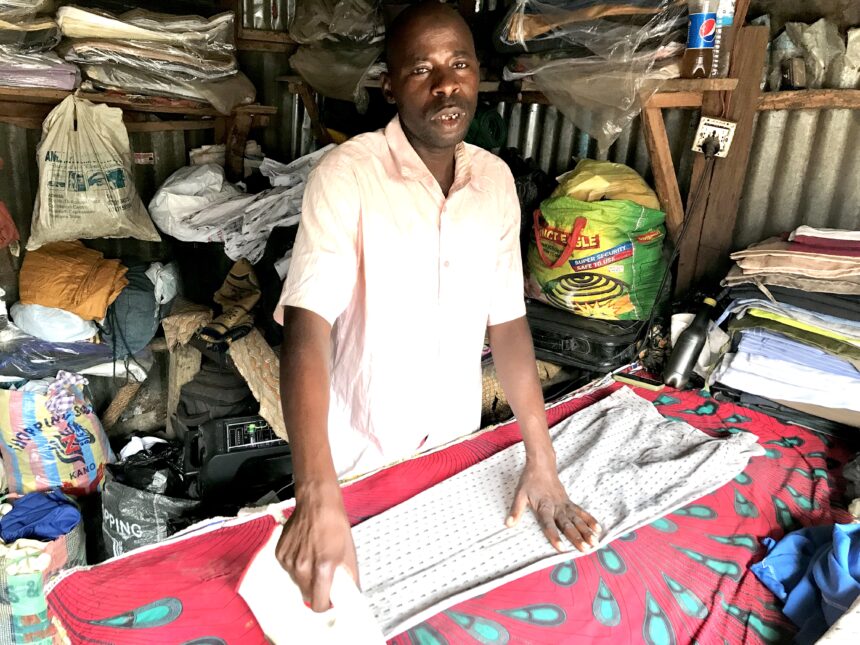In a small kiosk nestled in a street corner, Musa Jauro, 35, busies himself with sweeping the garbage strewn around, from the night before. When his young apprentices arrive, he abandons the work for them, assigning each boy to a task.
How soon things have changed, he wondered, as he looked back at the past, when he nearly took his life. “My story is intricate, amusing, and crazy , but most importantly, I’m grateful that despite the drastic steps taken, God gave me a chance to survive,” he remarked with a smile.
Born and raised in Kano amid squalor, Jauro dreamed of life outside of poverty.
“Initially, things seemed to be going according to plan in my early twenties,” he recounted. “I secured small jobs with plastic companies and initiated a small business with my earnings. I used part of my savings to assist my father in completing a modest apartment after years of effort. I was also able to support the education and marriage of some of my siblings.”
Jauro’s ambition surged with his rising achievements. He envisioned a future that was brimming with opportunities, and soon came to believe that he could lift his family out of their dire straits by dint of hard work. As he explained, his next goal on the line was getting a degree at the university.
This time, Jauro’s plans wouldn’t come to fruition, however. After being wrongly accused by a colleague, Jauro was dismissed from work. His world began to crumble like a house of cards. Every effort to secure new employment was met with rejection. Those he thought he could bank on left him in the lurch, driving him to near depression. Nothing seemed to matter to him, and he began to contemplate suicide.
“In 2015, I reached a point where I decided to end my life. Everyone I thought I could lean on turned against me, blaming me for my misfortunes. At that moment, suicide seemed like the only escape.”
Nigeria, with a population exceeding 200 million, has emerged as a focal point for global suicide rates, with a disturbing figure of 17.3 suicides per 100,000 people. In fact, this surpasses the global average of 10.5 per 100,000 and Africa’s rate of 12.0 per 100,000. Global data highlights an upward trend in suicide rates since 2012.

A study published by General Psychiatry reveals that Nigeria documented 350 suicide cases between January 2010 and December 2019. According to the analysis, the statistics comprised male victims (80.6%), with 51.8% involving married individuals. Students made 36.6%, with 40.3% of suicides occurring in semi-urban areas. In addition, 25.3% of the suicide cases involved victims aged 25-34, with hanging and poisoning being the preferred means of dying.
Among the factors responsible for the spurt in suicide are poverty, substance abuse, emotional distress, substance abuse, as seen in the case of Jauro. Worn down by the trauma of living through each day without money and food, Jauro moved to take his own life.
“I decided to ingest a poisonous substance. As I began, a friend intervened and rushed me to the nearest clinic. Prompt medical attention saved my life,” he narrated.

Embracing each day anew
After a brush with death, Jauro came to develop a new perspective on life. Rather than languish in his depression, he “wasted no time in deciding to relocate to Abuja—not because I was certain of finding opportunities or had anyone to rely on. I simply needed a fresh start away from familiar surroundings,” he stated.
In Abuja, life was far from rosy for Jauro. Accommodation was a challenge, pushing him to sleep under the stairs of a shopping complex in Wuse.
“Life under the staircase was grueling. I had to beg during the day and return at night to avoid disturbing the locals.”
In December 2016, Jauro encountered a man who offered him a small house in a remote community, together with a modest sum for business.
“With the funds I received, I established an ironing business, enabling me to sustain myself and train others in the dry cleaning trade,” he beamed.
Although his business has been slow and steady, Jauro remains optimistic that his hard work will pay off in due time. These days, he takes pride in his wife and two children.
A Stoic perspective
Jauro’s near-death experience has instilled in him a stoic approach to hard times that guide his decisions in life.
“Every average or impoverished Nigerian is enduring immense hardship in this current economy. Though times are tough, I strive not to despair, holding onto the belief that things will improve,” he remarks.
In his laundry shop, Jauro wonders how many Nigerians are contemplating suicide, depressed by the prevailing hardship in the country.





